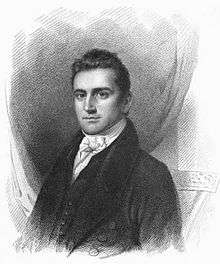Elias Cornelius
Elias Cornelius (1794–1832) was an American Christian missionary and ordained minister.
Elias Cornelius | |
|---|---|
 | |
| Born | July 30, 1794 |
| Died | February 12, 1832 (aged 37) |
| Alma mater | Yale College |
Life
Elias Cornelius' father was also named Elias Cornelius (1758–1823), and his mother was Rachel Stocker.[1] His father had joined the American Revolutionary War as a surgeon after some rudimentary training, but was taken prisoner on August 22, 1777. He met Ethan Allen in prison, but escaped on January 16, 1778, and rejoined the Continental Army.
Elias Cornelius was born July 30, 1794 in Somers, Weschester County, New York. At the age of sixteen, he began his college career at Yale College. After his undergraduate years, he continued to study theology at the Yale Divinity School under Timothy Dwight IV. He was licensed to preach on June 4, 1816 by the South Association of Congregational ministers, and appointed agent of the American Board of Commissioners for Foreign Missions (ABCFM).
As ABCFM agent he traveled to many cities and towns in the northeastern states including Rhode Island, Connecticut, and Maryland, preaching sermons and raising money. The majority of the money raised was to support the conversion of the Cherokee, Choctaw, Chickasaw, and Creek Indian tribes to Christianity. It was also to be used to establish schools within these nations. He continued to preach and fundraise as he traveled south where he finally ended in Northwest Georgia, near Cartersville in 1817. He spent 18 months there and it was at this location that he encountered the Cherokee tribe who led him to the Etowah Indian Mounds. He wrote in his journal about his visit and the journal became the first published account of a white person visiting the mounds. Neither Cornelius nor the group of Cherokee who led him to the site knew the relevance or purpose of the mounds at that time.[2] It was later discovered that the mounds were used as burial sites as well as residential areas and temples.
In September 1818 he married Mary Hooker, daughter of Asabel Hooker (minister of Goshen, Connecticut), descendants of Thomas Hooker (1586–1647). Their children were:[3]
- Elias Cornelius III, born August 13, 1819, married Lydia Francis Gray, and died December 7, 1857.[3]
- Mary Hooker Cornelius, born July 3, 1821.[3]
- Thomas Hooker Cornelius, born March 17, 1823 and died November 18, 1853 in San Francisco.[3]
- Edward Hooker Cornelius, born September 10, 1825 and died April 29, 1864 in Milwaukee, Wisconsin.[3]
- Sarah Edwards Cornelius, born February 14, 1830, married George B. Little in 1850, and had two daughters.[3]
- Jeremiah Evarts Cornelius, born December 25, 1831, married Sarah Fenner Storrs (daughter of William L. Storrs) in 1862, had a son and a daughter, and died March 4, 1896.[3]
On July 22, 1819 he became associate pastor of the Tabernacle Church in Salem, Massachusetts. After the death of Jeremiah Evarts, he was named secretary of the ABCFM in October 1831, but became ill. He died on February 12, 1832.[4]
Elias Boudinot, one of the students he introduced to the Foreign Mission School became a later a Cherokee National leader and named his son Elias Cornelius Boudinot in honour of Cornelius. Elias Cornelius Boudinot grew up to be a colonel in the Confederate States Army[5]
References
- Elias Cornelius (1903) [1833]. Journal of Dr. Elias Cornelius: a revolutionary surgeon. Graphic description of his sufferings while a prisoner in Provost Jail. Washington, DC: C.M. Tompkins and C.T. Sherman.
- Bela Bates Edwards (1842) [1833]. Memoir of the Rev. Elias Cornelius. Boston: Perkins & Marvin.
- Edward Hooker; Margaret Huntington Hooker (1909). The Descendants of Rev. Thomas Hooker, Hartford, Connecticut, 1586-1908. Harvard University. pp. 215, 352–353.
- William Buell Sprague, ed. (1857). "Elias Cornelius, D. D. 1816–1832". Annals of the American Pulpit: Trinitarian Congregational. Robert Carter & Brothers. pp. 633–643.
- James W. Parins (2005). Elias Cornelius Boudinot: A Life on the Cherokee Border. American Indian Lives. University of Nebraska Press. pp. 3–4. ISBN 978-0-8032-3752-0.
External links
- Gerald Edward Cornelius. "The American Revolution & Beyond". Genealogical voyage with one of the descendants of Captain Aaron Cornelius. Retrieved January 31, 2011.